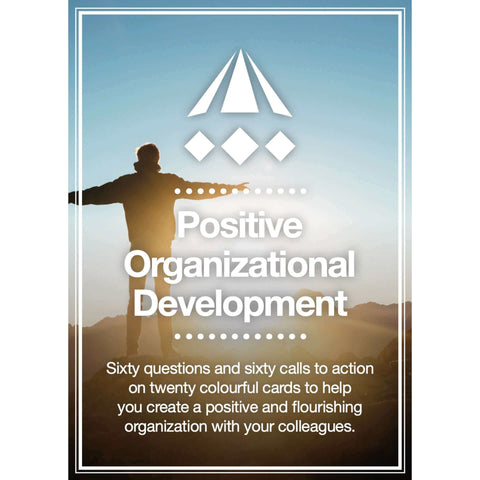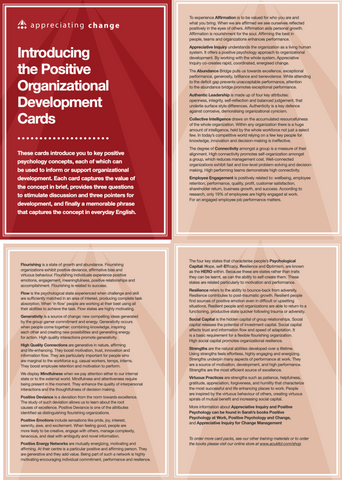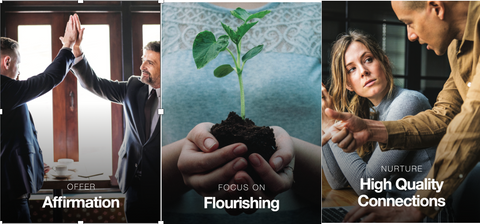Making Changes: Easy and Engaging Activities #4 A Place to Flourish: Using the Positive Organisational Development Cards to Create Flourishing Organisations

Impact: Increased understanding of the characteristics of flourishing organizations and the initial development of ideas for creating flourishing organisations
Materials Needed: One Pack of Positive Organisational Development Cards per Five/Six People
Remember, should you decide to buy a pack, you can get 10% off your first shop order with a newsletter subscription
Professional Use: Culture Development, Team Building, Strategy Development, Project Initiation
You can download this blog here
Who is this A Place to Flourish exercise for?
This exercise is designed for anyone who wants to, or is in a position to, help their organization become a place where people can flourish. Based on the science of positive organisational psychology, the exercise introduces key concepts, questions to stimulate discussion and ideas for action.
How does the A Place to Flourish exercise help with creating flourishing organizations?
Few people understand the characteristics of flourishing organizations. By introducing twenty key ideas from positive psychology and providing stimulus to discussion and ideas for action, this exercise can help teams or organizations create a vision of how they want to be and to start to move towards their dream of being A Place To Flourish.
How to conduct the A Place to Flourish exercise?
Preparation
- Ensure there are sufficient numbers of card packs for people to work in groups of five or six people.
- Have three flips ready on the wall entitled
- Most Important
- Quickest Wins
- Most Exciting
- Divide the large group into sub-groups of five or six people, around a table.
- Ask each group to separate the card pack into three piles
- The cover card and the ‘How Positive Organisational Development Cards support the organizational change and development process’ card and also the card at the end of the pack – the one titled ‘Introducing Positive Organisational Development Cards.’ These 3 cards can be set aside as they are not needed in the exercise.
- The two cards Introducing the Positive Organisational Development Cards (shown below, note both sides of the two cards are shown)
- The twenty concept cards
- Ask each group to take up the two, pink ‘Introducing the positive organisational development cards’.

- Ask them to read through them and to select from the twenty concepts outlined there...
- The one that seems to them the most important area to focus on for the future wellbeing of the organization and the people in it
- The one that feels most present in the organization already, that is, the one where there is already a basis of practice that can be extended
- The one that most excites them, that they would most like to see form a bigger part of the organisational culture.
- Ask each group to feedback their answers and record them on the prepared flipchart sheets.
- Depending on time, it can be interesting to ask each group about their selections and how they arrived at their particular selections. This can stimulate discussion.
- Next rearrange your existing groups into three new groups, mixing them up as best you can.
- Each of the new groups can select, or be given, one of the areas of inquiry (e.g. one of the three clusters of selections as indicated on the flipchart) to work with.
- Each group will now pull out of the concept card pile the concepts that are on their sheet. For example, the group looking at ‘The concepts that seems to to be the most important area to focus on developing for the future wellbeing of the organization and the people in it’ might have the cards below

- Now invite them to use the questions on the reverse of each card to stimulate a discussion about each of the concepts on their flipchart paper. There are three questions on each card so depending on time available you might instruct them to select just one question from each card to discuss.

- Take a little feedback from each of the groups about what is coming up in their discussions, focussing particularly on any insights or aspirations they are developing
- Next ask each group to return to the cards, looking now at the suggested ‘springboard’ activities on each card. These are generally, of necessity, broad and generic. The group needs to discuss these and start thinking about how the enactment of at least one of the selected activities might look in their organization.

- Ask each group to develop some suggestions for action in a way that they can feed back both the big ambition, what they are hoping to achieve, and the first step on the journey of change.
- Each of the groups to feedback their suggestions for action, to be discussed and ratified by the whole group. From this it should be possible to identify clear ‘areas of ambition’ and some distinct initial actions.
- At this point the exercise can go in a number of directions
- The group can work up an outline strategic plan for moving towards becoming A Place to Flourish
- The exercise can be opened up to the whole system through engaging the appreciative inquiry process. In this case one would take the identified concepts as starting points for discovery, then the whole system can be involved in discovery, dream, design and destiny in moving towards A Place to Flourish.
- The group can continue to work on A Place to Flourish by addressing further questions such as ‘Which of these is least prevalent in the current culture?’ And looking at how to boost that element of flourishing
- The group might think about how they will know of the effect their efforts are having. The Appreciative Inquiry SOAR model could be useful here.
The Positive Organisational Development packs featured here are available at the Positive Psychology Shop. A discount of 10% is available to newsletter subscribers
If you have any queries about the exercises as described, please contact Sarahlewis@acukltd.com. We will publish any queries and answers in the next newsletter to the benefit of all.
Please feel free to share the link to this page with any colleagues you feel may be interested. Or, direct them to the newsletter subscription page where they can find out about the newsletter service and subscribe for free.
Please also feel free to add a link to this blog and/or our shop to your website if you think it might add value to your website visitors.
Many thanks

